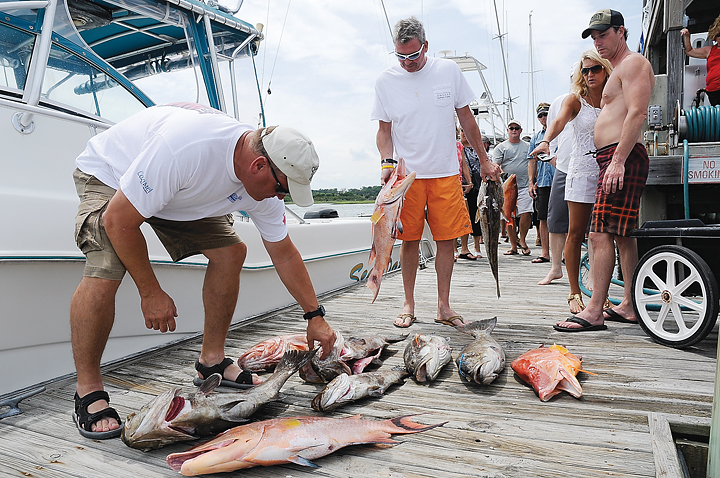This weekend, more than 80 of the area’s best Scuba and free divers will take part in the 8th annual Wrightsville Beach Spearfishing Tournament.
Participants will dive down and hunt for their catch Friday through Sunday, with weigh-ins at Seapath Yacht Club Friday 6–8 p.m., Saturday 6–8 p.m. and Sunday 1–2 p.m. Prizes are awarded to the heaviest fish in three divisions: inshore, pelagic and bottomfish.
Inshore species are smaller fish like flounder and sheepshead. Bottom species include grouper, snapper and hogfish, which can weigh as much as 30 pounds. Pelagic species, which are typically found about 60 miles offshore, include tunas, wahoo and mahi-mahi.
It’s rare for a competitor to catch one of those, tournament director Ryan McInnis said, but last year one fisherman speared a 65-pound fish. There are also categories for lionfish, an invasive species, and lobster. The heaviest lobster weighed last year was 15 pounds, McInnis said, describing it as a cross between “a scary insect, a dinosaur and a bulldog.”
“And this guy was free diving,” he said. “So he swam down 80 feet, pulled it out of a hole and swam it to the surface.”
Spearing a catch that large wouldn’t necessarily earn that competitor the victory, though, because prizes are awarded based on a participant’s heaviest two fish. The format ensures the most skilled hunter wins the tournament.
“You can’t just be lucky, you’ve got to be good,” McInnis said. “If you get lucky and shoot a big fish, you’ve still got to back it up with another fish.”
Spearfishing requires a great deal of skill, athleticism and training, he added, because participants dive so deep to hunt.
McInnis, a longtime diver, said after a day of spearfishing he feels “exhausted, like I’ve run a marathon.”
About half the tournament participants will dive using Scuba gear and the other half will free dive. Each technique has its downside, McInnis said—Scuba bubbles scare the fish but free divers are limited by their lung capacity.
As spearfishing gets more popular locally, there’s more crossover between the Scuba diving and free diving versions of the sport, he added.
“Scuba divers are taking free diving courses, and vice versa.”
The sport is growing locally because the waters around Wrightsville Beach present such a great diving location, McInnis said. When the conditions are good, the water is clear and blue and divers will see not only game fish, but all manner of sea creatures.
“There’s lots of stuff to look at that you don’t eat,” he said, naming manta rays, right whales, sharks, tropical reef fish and spotted dolphins.
“I’ve been lucky to dive all over the world,” he said, “and my favorite place to dive is our backyard, right here in North Carolina.”
For more information on the tournament, visit in-sea.com




